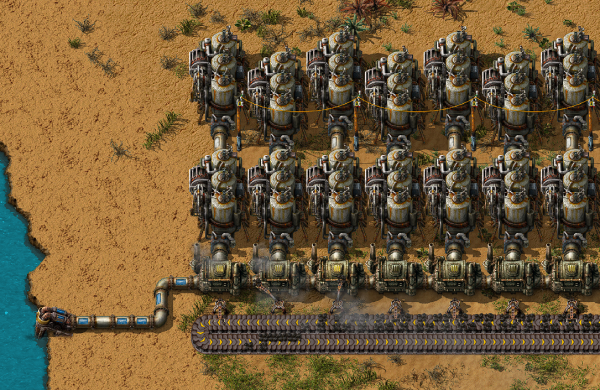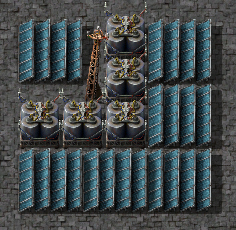Power production: Difference between revisions
Changed links going to redirect to direct links. |
Moving a section out. |
||
| Line 1: | Line 1: | ||
{{languages}} | {{languages}} | ||
There may be situations where any of the solutions described below is desired to be the primary power source for a facility, but it may collide with default behaviour of related machines. See [[Electric system#Network priorities|Network priorities]] for more information. | |||
== Steam power == | == Steam power == | ||
| Line 65: | Line 67: | ||
Try this checklist before you completely revamp your power source. You may also use this to rectify negative feedback loops. | Try this checklist before you completely revamp your power source. You may also use this to rectify negative feedback loops. | ||
* Did you connect the steam engine to the [[Electric | * Did you connect the steam engine to the [[Electric system]]? If not, a small yellow triangle will flash. To fix, Add some [[Small electric pole|power poles]] near the steam engines that go to machines needing that power. Any size will work. | ||
* Is steam able to reach all steam engines? | * Is steam able to reach all steam engines? | ||
* Do your pipes have water? Look at the glass windows in the pipes, hover over the pipes! Place some pipes or a tank at the end to see if there is really water coming through. If not, ensure all [[pipe]]s or [https://wiki.factorio.com/index.php?title=Pipe-to-Ground underground pipes] are connected together. | * Do your pipes have water? Look at the glass windows in the pipes, hover over the pipes! Place some pipes or a tank at the end to see if there is really water coming through. If not, ensure all [[pipe]]s or [https://wiki.factorio.com/index.php?title=Pipe-to-Ground underground pipes] are connected together. | ||
| Line 90: | Line 92: | ||
* The energy density per tile is much higher than it is with batteries. | * The energy density per tile is much higher than it is with batteries. | ||
* You won't get sudden blackouts when you're out of power. Instead, power goes out gradually as pressure drops. | * You won't get sudden blackouts when you're out of power. Instead, power goes out gradually as pressure drops. | ||
Revision as of 23:58, 22 December 2017
There may be situations where any of the solutions described below is desired to be the primary power source for a facility, but it may collide with default behaviour of related machines. See Network priorities for more information.
Steam power
Each Steam engine needs exactly 0.5 Boilers when running at full capacity. One offshore pump can supply 20 boilers and 40 steam engines.

Solar Panels/Accumulators
Optimal ratio
The optimal ratio is 0.84 (21:25) accumulators per solar panel, and 23.8 solar panels per megawatt required by your factory (this ratio accounts for solar panels needed to charge the accumulators). This means that you need 1.428 MW of production (of solar panels) and 100MJ of storage to provide 1 MW of power over one day-night cycle.
A "close enough" ratio is 20:24:1 accumulators to solar panels to megawatts required (for example, a factory requiring 10 MW can be approximately entirely powered, day and night, by 200 accumulators and 240 solar panels - this approximation differs from optimal only in that it calls for 2 extra solar panels, which is negligible).
This is taken from Accumulator / Solar Panel Ratio (which calculates this in an impressive mathematical way!) and another post in that thread (which calculates the solar panel to megawatt ratio in a different way).
 |
Calculations
The optimal ratio of accumulators per solar panel relies on many values in the game. These include the power generation of a solar panel, the energy storage of an accumulator, the length of a day, and the length of a night. There are also times between day and night called dusk and dawn which complicate the calculations. In vanilla factorio, without mods which change any of these values, the optimal ratio will be the same. This ratio is
Accumulators / Solar_panels =
(day + dawn) * (night + dawn * (day + dawn) / game_day) / game_day
* Solar_power / Accumulator_energy
which, given the default time lengths of: day = 17500/60 s; dawn or dusk = 5000/60 s; night = 2500/60 s, and the default: Solar_power = 60 kW; Accumulator_energy = 5 MJ = 5000 kJ, gives the optimal ratio of 0.84 accumulators per solar panel. If the player uses mods which change the power generation of solar panels, or the energy storage of accumulators, but not the length of days, a simplified version of this equation can be used.
Accumulators / Solar_panels = 70 s * Solar_power / Accumulator_energy
This equation could also be used to remember the vanilla optimal ratio given its simplicity. If the only effect the mod has on the game is it changes the total length of one day, without changing the ratio of dusk : day : dawn : night, then the equation can be simplified as
Accumulators / Solar_panels = 0.002016 /s * game_day
where game_day is the number of seconds in the game day which is 25000/60 s by default.
See also
- http://www.factorioforums.com/forum/viewtopic.php?f=5&t=5168
- http://www.factorioforums.com/forum/viewtopic.php?f=18&t=5394
- http://www.factorioforums.com/forum/viewtopic.php?f=5&t=7619
Nuclear power
- See also: Tutorial:Nuclear power
In general, nuclear power is produced by the following production chain: Uranium ore is mined and processed to uranium-235 and uranium-238, then uranium fuel cells are created from the two. These fuel cells are then burned in a nuclear reactor to create heat. The heat can be used to convert water to steam using a heat exchanger and the steam can be consumed by steam turbines to produce power.
A reactor without neighbor bonus needs 4 heat exchangers so that all its heat gets consumed. For each 100% neighbor bonus, the reactor needs 4 more heat exchangers.
| Ideal Ratio | Simple Ratio | Building |
|---|---|---|
| 25 | 1 | Offshore pump |
| 291 | 12 | Heat exchanger |
| 500 | 20 | Steam turbine |
Ensuring enough energy is produced
Try this checklist before you completely revamp your power source. You may also use this to rectify negative feedback loops.
- Did you connect the steam engine to the Electric system? If not, a small yellow triangle will flash. To fix, Add some power poles near the steam engines that go to machines needing that power. Any size will work.
- Is steam able to reach all steam engines?
- Do your pipes have water? Look at the glass windows in the pipes, hover over the pipes! Place some pipes or a tank at the end to see if there is really water coming through. If not, ensure all pipes or underground pipes are connected together.
See also the applied power math tutorial to answer the question how much coal do I need?
Energy Storage
See Accumulator.
Energy is available (or storable) from/to:
- Fuel.
- Capacity in the Accumulators.
- Steam. It can be created in boilers or heat exchangers and stored in the Storage tank. See below.
See Units#Power for info on energy units.
Storing steam in tanks
A storage tank filled with heat exchanger 500°C steam stores around 2.4GJ; a storage tank filled with boiler 165°C Steam stores 750MJ.
There are several advantages to storing energy in storage tanks vs. storing it in an accumulator:
- You don't need to produce electrical energy first.
- The energy density per tile is much higher than it is with batteries.
- You won't get sudden blackouts when you're out of power. Instead, power goes out gradually as pressure drops.